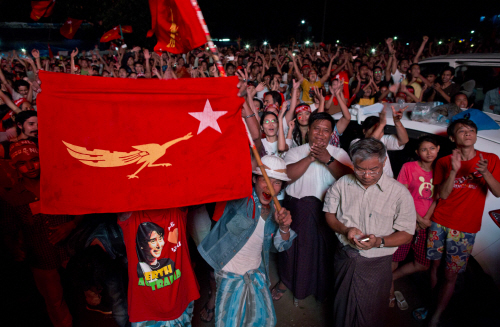 Supporters of Myanmar opposition leader Aung San Suu Kyi's party cheered as they watched the results on a giant screen outside the party headquarters in Yangon on Monday./ Source from AP, Yonhap News Supporters of Myanmar opposition leader Aung San Suu Kyi's party cheered as they watched the results on a giant screen outside the party headquarters in Yangon on Monday./ Source from AP, Yonhap News |
By AsiaToday reporter Koh Jina- Interest is on Myanmar's "new day" as the opposition National League of Democracy (NLD), led by Aung San Suu Kyi, appeared on course for a landslide victory that could let the country continue along a path toward full democracy from the military dictatorship that lasted more than half a century.
Several foreign media outlets, including AP, reported on Monday that NLD has won more than 90% of parliament seats in the country's historic election, making a big step away from 53 years of military rule. The NLD had to take at least 67% of all contested seats as the Maginot Line in order to gain a majority.
The sate-run English daily the Global New Light of Myanmar, which had rarely reported about Aung San Suu Kyi, ran its Monday headline as "Dawn of a New Era" after the election ended, suggesting future changes in the political landscape in Myanmar.
Ms. Suu Kyi has pledged that if her party comes to power, she will carry out full democracy, establish legalism, reconcile with minority groups, root out corruption, amend the Constitution, and promote economic development. So, if the NLD confirms its victory, Myanmar could make a first step towards full democracy.
Unfortunately, the future of Myanmar's democracy is not just bright.
Myanmar's military-backed government, which has been enforcing dictatorship for nearly half a century, has allowed democratic reforms and economic opening since 2011 after announcing roadmap to democracy in 2003 and 2008. However, the government has already ensured its powerful control of the country by preparing a military-protected constitution that reserves 25% of the legislature's seats for military, darkening outlook for democracy.
The religious conflict between Buddhists and Muslims minority is another problem. The current Thein Sein government has been conducting negotiations with 15 ethnic armed groups since 2013 to sign the ceasefire agreement, but only eight of them agreed to sign the agreement.
In economic aspects, the biggest assignment will be maintaining a high economic growth rate while continuing the reform and opening of the economy and maintaining the country's social stability. Since the opening of the economy in 2011, Myanmar economy has been growing as much as 8 % annually in average. However, the country is still one of the poorest countries in Asia with per capita GDP of around $1,198.
Meanwhile, business conditions for Korean companies may improve in Myanmar.
According to KOTRA's "Impact of Myanmar elections on Korean companies" report announced on Tuesday, several economic laws that have been delayed due to the election will be implemented if NLD comes to power, allowing Korean companies to expand their business opportunities in Myanmar.
Most Read
-
1
-
2
-
3
-
4
-
5
-
6
-
7





















